From "Don't Bomb Us - A blog by Al Jazeera Staffers"
I am a Canadian, born and raised in Ottawa. Over a year ago I packed up my family with baby and moved to Doha, Qatar to work for Al Jazeera. To be clear, I am not overtly political, though I have sympathies that you can probably guess given I have chosen to live in an Arab country. Nor did I come to Al Jazeera to make any grand statement or to perform aggressive acts against the West. Toronto is my home, I like it and I expect to return in a few years. I came to Al Jazeera for more mundane reasons: no taxes, easy winters and to get out of Canada's stagnating television industry. As such, you can imagine my total surprise when the news broke last week about Bush's alleged plan to bomb my place of work. That Bush would so cavalierly send up a "test balloon" on potentially turning me and/or any of my co-workers into collateral damage is truly outrageous.
When I first heard it, I did not believe it true - no Head of State, even one no longer held to the high standard of previous President's, would so openly muse with another Head of State about such a reprehensible act. But given Downings' cover up, I can only presume that this wasn't even an embarrasing case of gallows humour gone awry - he was and is deadly serious. To compound my concern, given he has not bombed yet, and given the leak is probably not a sufficient deterrent for a man so bent on destruction - I believe the threat is still real . So I am writing this post to let people outside of Al Jazeera know that the employees here are the same as employees everywhere: Canadian, Asian, African, European, American - wherever.
Like many of my fellow employees, I spend my days basically pushing paper and making a few decisions when necessary. We have families, we have people who rely on us to provide a home and we work in small ways for something better for ourselves and the people we love. Nothing more. So if we can be bombed here, thousands of miles from any battlezone, just like in Madrid...just like in London, then it makes me wonder if there really is any difference between Bush and the enemies he seems unable or maybe unwilling to identify.
Ned.
Al Jazeera Channel, Doha
Wednesday, November 30, 2005
Tuesday, November 29, 2005
Here is wisdom
...but maybe i need a toaster that scorches disney sillhouettes into bread. and i could probably use a webbed up fridge with a plasma display. i definitely need headphones and a tiny white rectangle. i mean, it will take 15,000 songs in my pocket, to shut out all of you bastards jabbering away on cell phones...
...here in southern ontario, we loves our suburbs. we are sprawling like there's no tomorrow. and we are using up some of the best farmland in the world to do it. all of the sprawl, all of the waste, all of the gluttony fed by oil. in the last century we remade our culture around the automobile. we changed the shape of our cities, we painted the landscape with tar and concrete stripes. but the fuel will run out. a dog will eat as much food as you put out. because the dog is wired to suspect that there won't be more of that easy food, so get while the getting is good. humans will devour the entirety of a resource because we are wired to believe that there will always be a little more, because we're kind of stubborn and greedy...
Go and read the rest...
...here in southern ontario, we loves our suburbs. we are sprawling like there's no tomorrow. and we are using up some of the best farmland in the world to do it. all of the sprawl, all of the waste, all of the gluttony fed by oil. in the last century we remade our culture around the automobile. we changed the shape of our cities, we painted the landscape with tar and concrete stripes. but the fuel will run out. a dog will eat as much food as you put out. because the dog is wired to suspect that there won't be more of that easy food, so get while the getting is good. humans will devour the entirety of a resource because we are wired to believe that there will always be a little more, because we're kind of stubborn and greedy...
Go and read the rest...
Sunday, November 27, 2005
Good Night, and Good Luck
Last night, P-Doug called me up and spoke in the most glowing terms of the movie Good Night, and Good Luck. Set in the early 1950s, filmed unself-consciously in black and white, it's the story of Edward R. Murrow taking on the Orwellian excesses of the day in the form of the irresponsible Senator Joe McCarthy. While this film is largely George Clooney's baby (directed and co-written by him), he himself takes a supporting role in the movie, and leaves the plum assignment to David Strathairn. I must confess to being largely unaware of Strathairn's work, with the notable exception of his role as Pierce Patchet in L.A. Confidential, among my favourite movies.
Murrow is played by Strathairn with acid dryness, which gives an edge to what is a clear underlying humanity, and counterpoints what might even be called a certain sentimentality. One of the delights of the movie is the quick wit, which never seems forced or unbelievable. Early on, when discussing the potential loss of $3000 worth of ad revenue with a management figure played by (I believe) Jeff Daniels, Murrow offers to pay the loss himself, splitting it with Fred Friendly (Clooney's character). Murrow lays it on a bit thick, saying something to the effect that "Fred's kids will just have to do without Christmas presents this year." This is met with the rejoinder, "He's a Jew...", which Murrow instantly counters with, "Well, don't tell Fred; he loves Christmas." The audience I was in appreciated this rapid-fire give-and-take, all at once arid but good-natured, as the best comedy is.
Not that the movie is a comedy. Anything but. It's a deadly serious examination of a moment in history chracterized by a paranoia all too familar to us in the post-9/11 world. Back then, it was taking shortcuts with civil liberties in the name of rooting out communism at home; today, the bogeyman is terrorism, but the methods, the means, and the slogans have a chillingly familiarity, the same absolutism of schoolyard persecution. The movie is filmed in black and white, but it is really concerned with the shades of grey that democracy is supposed to be all about.
Putting aside the metaphoric aspect of chosing monochrome, the practical upshot of filming in black and white is to lend a strange, anachronistic immediacy to the film. Senator McCarthy, who appears in the movie only in film bites (including a slimy 'rebuttal' to a piece by Murrow that he uses not to address the points raised but to cast aspersions on Murrow and his colleagues), suddenly becomes a visceral presence, rather than monster dead nearly fifty years.
The movie, though following events from 1953 to 1954, is enveloped by an occasion in October, 1958, in which Murrow is being honoured for his work. In addressing the audience, he happens to remark that how television takes its responsibilities will be noted by historians in "fifty or a hundred years", making the viewer acutely aware of being at the middle point of that gulf. In 1954, civil liberties under attack in the name of national security had Murrow as their champion. One is left with the distinct feeling that the recent slide has gone even further, with no similarly daring quixotic defender in sight. The insertion of a televised quote of President Eisenhower near the end of the movie is subtle, but its message is clear; its application seemingly far more timely now than it was at the time it was made:
"Why are we proud? We are proud, first of all, because from the beginning of this nation, a man can walk upright, no matter who he is, or who she is. He can walk upright and meet his friend or his enemy; and he does not feel that because that enemy may be in a position of great power that he can be suddenly thrown in jail to rot there without charges and with no recourse to justice. We have the habeas corpus act, and we respect it."
Murrow is played by Strathairn with acid dryness, which gives an edge to what is a clear underlying humanity, and counterpoints what might even be called a certain sentimentality. One of the delights of the movie is the quick wit, which never seems forced or unbelievable. Early on, when discussing the potential loss of $3000 worth of ad revenue with a management figure played by (I believe) Jeff Daniels, Murrow offers to pay the loss himself, splitting it with Fred Friendly (Clooney's character). Murrow lays it on a bit thick, saying something to the effect that "Fred's kids will just have to do without Christmas presents this year." This is met with the rejoinder, "He's a Jew...", which Murrow instantly counters with, "Well, don't tell Fred; he loves Christmas." The audience I was in appreciated this rapid-fire give-and-take, all at once arid but good-natured, as the best comedy is.
Not that the movie is a comedy. Anything but. It's a deadly serious examination of a moment in history chracterized by a paranoia all too familar to us in the post-9/11 world. Back then, it was taking shortcuts with civil liberties in the name of rooting out communism at home; today, the bogeyman is terrorism, but the methods, the means, and the slogans have a chillingly familiarity, the same absolutism of schoolyard persecution. The movie is filmed in black and white, but it is really concerned with the shades of grey that democracy is supposed to be all about.
Putting aside the metaphoric aspect of chosing monochrome, the practical upshot of filming in black and white is to lend a strange, anachronistic immediacy to the film. Senator McCarthy, who appears in the movie only in film bites (including a slimy 'rebuttal' to a piece by Murrow that he uses not to address the points raised but to cast aspersions on Murrow and his colleagues), suddenly becomes a visceral presence, rather than monster dead nearly fifty years.
The movie, though following events from 1953 to 1954, is enveloped by an occasion in October, 1958, in which Murrow is being honoured for his work. In addressing the audience, he happens to remark that how television takes its responsibilities will be noted by historians in "fifty or a hundred years", making the viewer acutely aware of being at the middle point of that gulf. In 1954, civil liberties under attack in the name of national security had Murrow as their champion. One is left with the distinct feeling that the recent slide has gone even further, with no similarly daring quixotic defender in sight. The insertion of a televised quote of President Eisenhower near the end of the movie is subtle, but its message is clear; its application seemingly far more timely now than it was at the time it was made:
"Why are we proud? We are proud, first of all, because from the beginning of this nation, a man can walk upright, no matter who he is, or who she is. He can walk upright and meet his friend or his enemy; and he does not feel that because that enemy may be in a position of great power that he can be suddenly thrown in jail to rot there without charges and with no recourse to justice. We have the habeas corpus act, and we respect it."
Being Human
I thought I'd tell you about this movie. It's probably one you've missed. I don't even remember it being in the theatres, but I found a copy of it in the delete bin at a local video store a couple of years ago, and from time to time I pull it out, dust it off, and let it roll.
Being Human is a series of five vignettes, set at various points in time, each bringing us a bit closer to modernity. Three things unite the threads: a fruity-voiced woman narrator, Robin Williams as the central character, and the name of that character being "Hector", regardless of the time or place.
Being Robin Williams
I should start off by pointing out that my feelings towards Robin Williams are kind of ambivalent... but I say this, in the long run, to praise the movie.
I loved Mork and Mindy as a kid. I think most people my age did. But as I grew into my teen years and Robin Williams started showing up in the movies, I found him irritating in anything he did in that typical frantic, hyperkinetic way of his. I have the same problem with Steve Martin and particularly Jim Carrey, for whom I have almost no use. These are all actors who are at their best when restrained, when the magic of their wry subtlety can be felt (think of Martin as Neal Page in Planes, Trains, and Automobiles). Carrey, though, simply can't help mugging; even in The Truman Show. So this is my issue with these guys. Great, you can go off like a hyperglycemic six-year-old at the fair. Now show us you can act.
I also have a problem with Williams in roles where he plays a pathetic schlub. I can take this up to a point, after which I find it just gets cloying. And while he does have a few roles like this in Being Human, the vignettes are short enough that he's not given enough rope with which to hang himself. If he's down and out for ten minutes, he's on his way up the next. That works well. But I found the much-praised What Dreams May Come virtually unwatchable (for this and so many reasons). Way too much rope.
Getting Back to Being Human...
This movie's finely crafted. As I said, it features five stories of increasing modernity that illustrate some of the issues that, while usually particular to their time, also plug into emotions that span time and unite human beings no matter when they lived. The stories range from the first, set in neolithic Europe, in which a man and his family, living in isolation by a lake or sea, are set upon by seafaring mauraders (among whom is Robert Carlisle, making an early appearance before fame caught up with in Trainspotting). The second is the story of a slave in Roman times, loyal to his rather oblivious master, who, when his master's fortunes turn sour, is suddenly expected to take his own life at his master's side. The third is set in Medieval Europe, and tells the story of a man on way home from some war, linking up with a widowed woman whose language he does not speak, and having to make a choice about whether to stay with her family or press on to return to his own. The fourth is set in the 15th or 16th century, telling the tale of a weaselly Portuguese minor aristocrat, shipwrecked on the African coast with dozens of others, including the woman he spurned. And finally, the story of a man, set in contemporary New York City, rebuilding his relationship with his estranged children.
Every one of these stories is eminently watchable. They average about twenty minutes each, though I think the last story is probably slightly longer. Of the five, my favourites are the story of the Roman slave and the divorced father in New York. If I had to pick one as my favourite overall, it would probably be the story of Hector, slave to Roman businessman Lucinnius, played with hilarious self-absorbtion by John Turturro (whom I loved as Pete in O Brother, Where Art Thou? and Herbert Stempel in Quiz Show). A word here about the narration... in most movies, expository narration is just anathama. But in this movie, it works. It feels less like you're being spoonfed "here's now to feel now" notes as hands moulding your emotions into finer vessels. We can all imagine just how awful being a slave would be in the abstract. But we're remote from the experience. It really helps frame just what that actually, practically means when, at the start of the episode, the narrator says, "There was a man. He had a bed, he had a woman, and he had a child. But it was not his bed, not his woman, not his child. Everything he had, even his smallest humiliation, belonged to his master." This is the case; the bed is the property of Lucinnius, the woman is also a slave, and the child is Lucinnius's son, who has an obvious affection for Hector. Lucinnius is a trader, trying to make his way out of debt. When his cargo is lost at sea in a storm, his creditors make it clear they expect him to commit suicide. Lucinnius then informs Hector that as his most loyal slave, Hector ought to commit suicide alongside him. How will it look if he doesn't? The story moves forward from there, dealing with Hector's dilemma.
The easiest story to plug into is the last, set in modern New York City. Here, Hector is a businessman in partnership with a friend. It turns out he met the friend in prison when he was serving time for accounting irregularities, during which time his wife divorced him, and he became estranged from his children. The story finds him reasonably prosperous, working to better his lot, courting a woman who counts on him but is frequently let down as Hector juggles too many balls. It opens with him taking abuse from a woman who, while seated on the toilet, has crashed through the floor of an apartment building owned by his partner. From there, he is asked to look after a small but important matter by his girlfriend, but which slips through the cracks as he picks up his son and daughter to spend time with them at the shore. From a shaky start, his relationship with his kids is slowly rebuilt as they rediscover the things they had in common, discover new touchstones, and the adolescent daughter comes up with the means to head off the upcoming (and no doubt terminal) trouble with Hector's girlfriend. It's a wonderful piece about honesty and healing, and it nicely tops off the movie. In some regards, it bears a remarkable similarity to the arc of the recent War of the Worlds (less, of course, the murdering aliens and general end-of-the-world thing).
Being Human is a nice little gem set in velvet. It's not easy to find, but if you should come across it, it's worth the time to see.
Being Human is a series of five vignettes, set at various points in time, each bringing us a bit closer to modernity. Three things unite the threads: a fruity-voiced woman narrator, Robin Williams as the central character, and the name of that character being "Hector", regardless of the time or place.
Being Robin Williams
I should start off by pointing out that my feelings towards Robin Williams are kind of ambivalent... but I say this, in the long run, to praise the movie.
I loved Mork and Mindy as a kid. I think most people my age did. But as I grew into my teen years and Robin Williams started showing up in the movies, I found him irritating in anything he did in that typical frantic, hyperkinetic way of his. I have the same problem with Steve Martin and particularly Jim Carrey, for whom I have almost no use. These are all actors who are at their best when restrained, when the magic of their wry subtlety can be felt (think of Martin as Neal Page in Planes, Trains, and Automobiles). Carrey, though, simply can't help mugging; even in The Truman Show. So this is my issue with these guys. Great, you can go off like a hyperglycemic six-year-old at the fair. Now show us you can act.
I also have a problem with Williams in roles where he plays a pathetic schlub. I can take this up to a point, after which I find it just gets cloying. And while he does have a few roles like this in Being Human, the vignettes are short enough that he's not given enough rope with which to hang himself. If he's down and out for ten minutes, he's on his way up the next. That works well. But I found the much-praised What Dreams May Come virtually unwatchable (for this and so many reasons). Way too much rope.
Getting Back to Being Human...
This movie's finely crafted. As I said, it features five stories of increasing modernity that illustrate some of the issues that, while usually particular to their time, also plug into emotions that span time and unite human beings no matter when they lived. The stories range from the first, set in neolithic Europe, in which a man and his family, living in isolation by a lake or sea, are set upon by seafaring mauraders (among whom is Robert Carlisle, making an early appearance before fame caught up with in Trainspotting). The second is the story of a slave in Roman times, loyal to his rather oblivious master, who, when his master's fortunes turn sour, is suddenly expected to take his own life at his master's side. The third is set in Medieval Europe, and tells the story of a man on way home from some war, linking up with a widowed woman whose language he does not speak, and having to make a choice about whether to stay with her family or press on to return to his own. The fourth is set in the 15th or 16th century, telling the tale of a weaselly Portuguese minor aristocrat, shipwrecked on the African coast with dozens of others, including the woman he spurned. And finally, the story of a man, set in contemporary New York City, rebuilding his relationship with his estranged children.
Every one of these stories is eminently watchable. They average about twenty minutes each, though I think the last story is probably slightly longer. Of the five, my favourites are the story of the Roman slave and the divorced father in New York. If I had to pick one as my favourite overall, it would probably be the story of Hector, slave to Roman businessman Lucinnius, played with hilarious self-absorbtion by John Turturro (whom I loved as Pete in O Brother, Where Art Thou? and Herbert Stempel in Quiz Show). A word here about the narration... in most movies, expository narration is just anathama. But in this movie, it works. It feels less like you're being spoonfed "here's now to feel now" notes as hands moulding your emotions into finer vessels. We can all imagine just how awful being a slave would be in the abstract. But we're remote from the experience. It really helps frame just what that actually, practically means when, at the start of the episode, the narrator says, "There was a man. He had a bed, he had a woman, and he had a child. But it was not his bed, not his woman, not his child. Everything he had, even his smallest humiliation, belonged to his master." This is the case; the bed is the property of Lucinnius, the woman is also a slave, and the child is Lucinnius's son, who has an obvious affection for Hector. Lucinnius is a trader, trying to make his way out of debt. When his cargo is lost at sea in a storm, his creditors make it clear they expect him to commit suicide. Lucinnius then informs Hector that as his most loyal slave, Hector ought to commit suicide alongside him. How will it look if he doesn't? The story moves forward from there, dealing with Hector's dilemma.
The easiest story to plug into is the last, set in modern New York City. Here, Hector is a businessman in partnership with a friend. It turns out he met the friend in prison when he was serving time for accounting irregularities, during which time his wife divorced him, and he became estranged from his children. The story finds him reasonably prosperous, working to better his lot, courting a woman who counts on him but is frequently let down as Hector juggles too many balls. It opens with him taking abuse from a woman who, while seated on the toilet, has crashed through the floor of an apartment building owned by his partner. From there, he is asked to look after a small but important matter by his girlfriend, but which slips through the cracks as he picks up his son and daughter to spend time with them at the shore. From a shaky start, his relationship with his kids is slowly rebuilt as they rediscover the things they had in common, discover new touchstones, and the adolescent daughter comes up with the means to head off the upcoming (and no doubt terminal) trouble with Hector's girlfriend. It's a wonderful piece about honesty and healing, and it nicely tops off the movie. In some regards, it bears a remarkable similarity to the arc of the recent War of the Worlds (less, of course, the murdering aliens and general end-of-the-world thing).
Being Human is a nice little gem set in velvet. It's not easy to find, but if you should come across it, it's worth the time to see.
Friday, November 25, 2005
Soda yah think I'm gonna write about pop?
I've always been a Diet Pepsi man. For as long as I've been drinking diet pop instead of the sugared stuff, this has been my standard. I like the taste of it better than 'regular' Pepsi, which I prefer to 'regular' Coke. Bottom of the list is Diet Coke. To me, it takes like weak battery acid with sweetener.
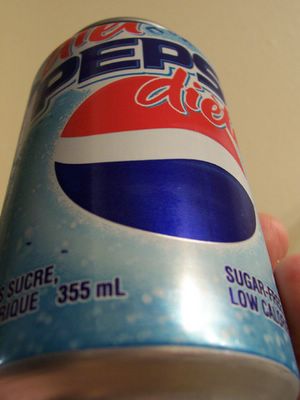
The reigning champion...
A few weeks ago, a buddy of mine brought over a couple of 2L bottles of Coke Zero... which I admit, I'd never even heard of before. This stuff is a sensation! It tastes 95% like 'regular' Coke. They're actually using the original formula, just replacing the sugar with aspartame. I drink a lot of pop, so I burned through a 24-can raft of the stuff in about a week. Well, it's sure a nice change. But I still find Coke a little harsh. Pepsi goes down easier. It's a little more palatable. So Diet Pepsi still wears the crown around here. But! It has a definite rival now. If Coke has any sense, they'll deep-six Diet Coke and replace it in every restaurant in the world with Coke Zero as quickly as possible. If you haven't tried it yet, do yourself a... flavour.
Okay... sorry about that. :)
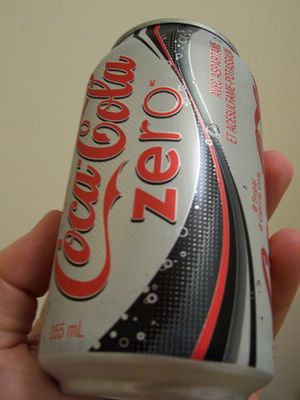
The challenger

The reigning champion...
A few weeks ago, a buddy of mine brought over a couple of 2L bottles of Coke Zero... which I admit, I'd never even heard of before. This stuff is a sensation! It tastes 95% like 'regular' Coke. They're actually using the original formula, just replacing the sugar with aspartame. I drink a lot of pop, so I burned through a 24-can raft of the stuff in about a week. Well, it's sure a nice change. But I still find Coke a little harsh. Pepsi goes down easier. It's a little more palatable. So Diet Pepsi still wears the crown around here. But! It has a definite rival now. If Coke has any sense, they'll deep-six Diet Coke and replace it in every restaurant in the world with Coke Zero as quickly as possible. If you haven't tried it yet, do yourself a... flavour.
Okay... sorry about that. :)

The challenger
Friday Nite Picture Show
Some recent pictures to confound and amaze! ...Or at least kill a couple of minutes.

Advanced green! There is a God!

Bananaside

The banana picks... English!!

Ride my banana.
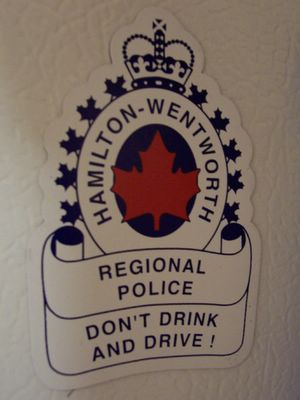
Well, I sure hope they don't...!

Taz want chips!!

Wow, that's a lotta bread, man...

The last thing an apple ever sees...

Got any wooden nuts?

Weapons of mass construction

New ways, new ways... I dream of wires...

Computer city
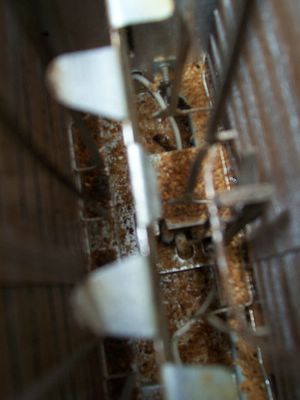
20,000 Leagues Under the Toaster
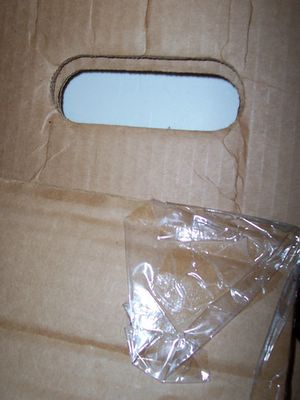
What my cats see when they hide in the banana box

Advanced green! There is a God!

Bananaside

The banana picks... English!!

Ride my banana.

Well, I sure hope they don't...!

Taz want chips!!

Wow, that's a lotta bread, man...

The last thing an apple ever sees...

Got any wooden nuts?

Weapons of mass construction

New ways, new ways... I dream of wires...

Computer city

20,000 Leagues Under the Toaster

What my cats see when they hide in the banana box
Wednesday, November 23, 2005
Liberty Stands Still (as in "still can't believe they made this")
Liberty Stands Still.
You remember the promos, right? Rich woman from a family that sells arms. Black sniper with an axe to grind (pardon the pun). People getting shot. Sanctimony. That's right. Now you remember.
I admit, I was intrigued enough to wonder how it plays out. So when I saw it in the delete bin for five bucks, I figured what the hell. (Five bucks is my "what the hell" point. If it's range of the price of renting it, give or take a buck, and I get to keep it if I like it, well... what the hell!)
This is one of the worst movies I've ever seen. It's fucking pointless. Its logic, if you can call it that, is insulting. Let me illustrate.
Suppose, in the 1960s, when Ralph Nader had set out to alert the world about the dangers of the American automotive industy (in particular, the Chevy Corvair), instead of writing Unsafe At Any Speed he had kidnapped John Delorean, tied him to the starting post of a race track, and then proceeded to run innocent people over with an Impala. Sounds brainless, doesn't it? Welcome to the world of Liberty Stands Still. A man whose daughter is killed by a boy with a gun plants a bomb in public and begins to shoot people, and then kills himself at the end (sorry if I'm spoiling it, but come on... in Hollywood, evildoers always die at the end... no surprises here; not really). And why? To instigate a public debate on the Second Amendment (oh, yeah! That's never been done before, has it? That would solve everything!). To her credit, Liberty does point out that all the NRA would do would be to use Joe (the assassin) as a poster boy for why 'decent' people need guns in the first place.
Liberty and her husband and friends are entirely cynical. If that's meant to endear her to you as the movie progresses and she becomes less snarky, it doesn't. Her snotty attitude to a guy holding a gun on her while she's chained to a hot dog stand is bravado of an entirely unbelievable degree. Even if it were believable, it's unappealing. In the course of the movie, she doesn't change or grow. She goes from mouthing platitudes about how her company isn't responsible to begging for people's lives. But these aren't diametrically opposed things. It's hardly surprising, really, that someone could, say, build cars, but not want them used to run people over, particularly right in front of their faces. But they still might think building cars is a good idea, in spite of that. So what the movie really turns out to be is a colossal set-up to let a guy play God, and then getting away with it. He even knows everything about everyone. It's absurd. You can just about hear every potential Eric Harris and Dylan Klebold in the audience spraying their shorts over this. Terrific.
I think the worst thing of all, though, is the music. This shitty, jarring, ceaseless disco shit they WON'T STOP PUMPING at you. You know what the director's really saying, don't you? "You're too much of a drooling idiot to judge for yourself the gravity of what's going on here so I'm going to poke you in the ear with my musical dick to remind you to be excited." I sat there thinking just how much more presence the movie would have if the calm of the sound track and the calm of the killer were counterpointed by his actions and the reactions to them. But you never get the chance to experience it.
I tried to think of movies where the music was used sparingly and the action instead carried the story. The first one that came to mind was Midnight Cowboy. While I'll be the first to admit they more than got their money out of that Harry Nilsson "Everybody's Talkin' At Me" song in the first half hour, other than that, there's almost no music in the movie. The exceptions I can think of all seem appropriate, even poignant. The "Orange Juice On Ice" commercial heard through Joe's beloved radio as he and Ratso, freezing and dreaming of Florida, take it to the pawn shop... the weird music as Joe spaces out for the first time at the party... the sad harmonica music at the end as Joe holds the body of his dead friend Ratso the last couple of miles into Miami. Now imagine how much less affecting that would have been if they'd been blowing the tune at you through the whole movie instead of just there (and the moment Joe first runs out of money in the hotel room). But there's no music to tell you how to feel when Ratso's standing at his father's grave with Joe. No music to tell you how to feel when Joe's invited to the party and Ratso isn't. No music to tell you how to feel when Joe, stung by Ratso's suggestion he's gay, turns the tables and embarrasses Ratso by accusing him of never having had sex at all, and probably rightly. Midnight Cowboy trusts the audience to be human, not just Pavlovian dogs with wallets, like Liberty Stands Still.
I wish I'd known this yesterday. Then Liberty Stands Still would still be Liberty Gathers Dust.
You remember the promos, right? Rich woman from a family that sells arms. Black sniper with an axe to grind (pardon the pun). People getting shot. Sanctimony. That's right. Now you remember.
I admit, I was intrigued enough to wonder how it plays out. So when I saw it in the delete bin for five bucks, I figured what the hell. (Five bucks is my "what the hell" point. If it's range of the price of renting it, give or take a buck, and I get to keep it if I like it, well... what the hell!)
This is one of the worst movies I've ever seen. It's fucking pointless. Its logic, if you can call it that, is insulting. Let me illustrate.
Suppose, in the 1960s, when Ralph Nader had set out to alert the world about the dangers of the American automotive industy (in particular, the Chevy Corvair), instead of writing Unsafe At Any Speed he had kidnapped John Delorean, tied him to the starting post of a race track, and then proceeded to run innocent people over with an Impala. Sounds brainless, doesn't it? Welcome to the world of Liberty Stands Still. A man whose daughter is killed by a boy with a gun plants a bomb in public and begins to shoot people, and then kills himself at the end (sorry if I'm spoiling it, but come on... in Hollywood, evildoers always die at the end... no surprises here; not really). And why? To instigate a public debate on the Second Amendment (oh, yeah! That's never been done before, has it? That would solve everything!). To her credit, Liberty does point out that all the NRA would do would be to use Joe (the assassin) as a poster boy for why 'decent' people need guns in the first place.
Liberty and her husband and friends are entirely cynical. If that's meant to endear her to you as the movie progresses and she becomes less snarky, it doesn't. Her snotty attitude to a guy holding a gun on her while she's chained to a hot dog stand is bravado of an entirely unbelievable degree. Even if it were believable, it's unappealing. In the course of the movie, she doesn't change or grow. She goes from mouthing platitudes about how her company isn't responsible to begging for people's lives. But these aren't diametrically opposed things. It's hardly surprising, really, that someone could, say, build cars, but not want them used to run people over, particularly right in front of their faces. But they still might think building cars is a good idea, in spite of that. So what the movie really turns out to be is a colossal set-up to let a guy play God, and then getting away with it. He even knows everything about everyone. It's absurd. You can just about hear every potential Eric Harris and Dylan Klebold in the audience spraying their shorts over this. Terrific.
I think the worst thing of all, though, is the music. This shitty, jarring, ceaseless disco shit they WON'T STOP PUMPING at you. You know what the director's really saying, don't you? "You're too much of a drooling idiot to judge for yourself the gravity of what's going on here so I'm going to poke you in the ear with my musical dick to remind you to be excited." I sat there thinking just how much more presence the movie would have if the calm of the sound track and the calm of the killer were counterpointed by his actions and the reactions to them. But you never get the chance to experience it.
I tried to think of movies where the music was used sparingly and the action instead carried the story. The first one that came to mind was Midnight Cowboy. While I'll be the first to admit they more than got their money out of that Harry Nilsson "Everybody's Talkin' At Me" song in the first half hour, other than that, there's almost no music in the movie. The exceptions I can think of all seem appropriate, even poignant. The "Orange Juice On Ice" commercial heard through Joe's beloved radio as he and Ratso, freezing and dreaming of Florida, take it to the pawn shop... the weird music as Joe spaces out for the first time at the party... the sad harmonica music at the end as Joe holds the body of his dead friend Ratso the last couple of miles into Miami. Now imagine how much less affecting that would have been if they'd been blowing the tune at you through the whole movie instead of just there (and the moment Joe first runs out of money in the hotel room). But there's no music to tell you how to feel when Ratso's standing at his father's grave with Joe. No music to tell you how to feel when Joe's invited to the party and Ratso isn't. No music to tell you how to feel when Joe, stung by Ratso's suggestion he's gay, turns the tables and embarrasses Ratso by accusing him of never having had sex at all, and probably rightly. Midnight Cowboy trusts the audience to be human, not just Pavlovian dogs with wallets, like Liberty Stands Still.
I wish I'd known this yesterday. Then Liberty Stands Still would still be Liberty Gathers Dust.
Saturday, November 19, 2005
What the autumn's brought...

Takin' it easy
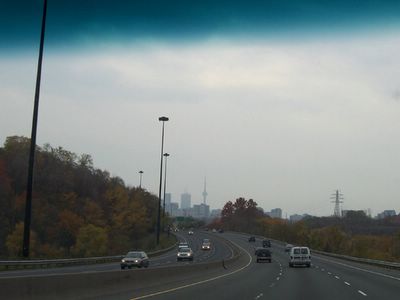
Don Valley Parkway southbound
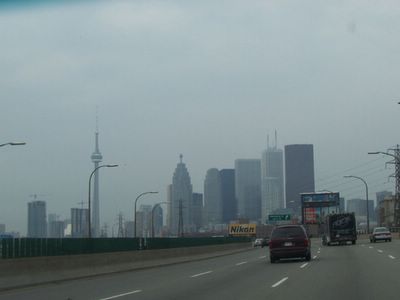
Gardiner Expressway westbound
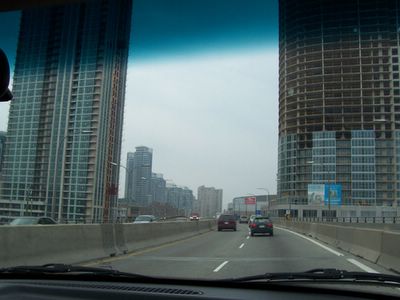
Can we peek in the windows?
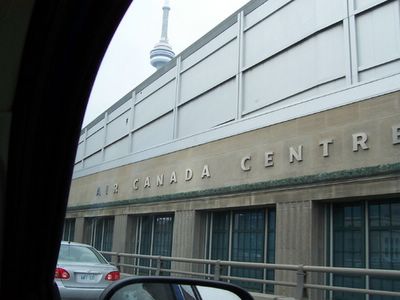
Passing the ACC
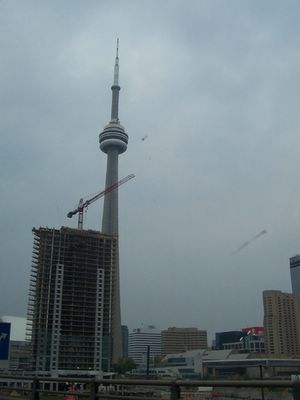
Only yuppies must be able to see the Lake!

Passing SkyDome ("Rogers Centre", as if...)
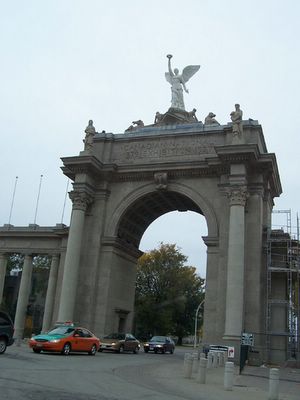
Passing the Prince's Gates at the Canadian National Exhibition
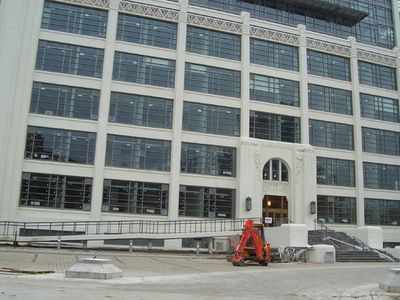
Something new

Eastbound on Lakeshore Blvd.

How many points would we score for this guy?
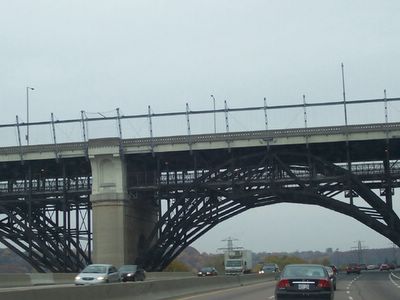
Northbound on the DVP passing under the Bloor Viaduct
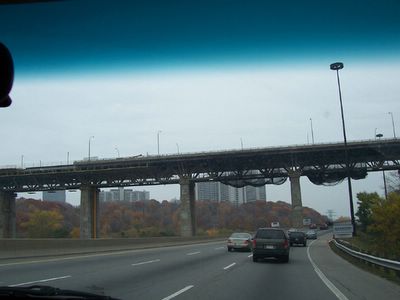
Passing under Millwood Road

Union Jack, Don Mills Road northbound south of Eglinton Avenue
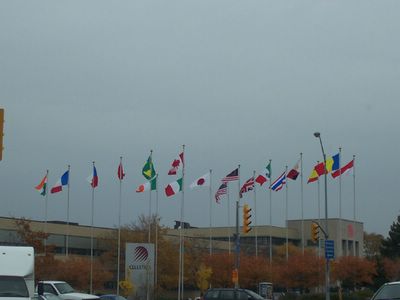
Celestica (IBM) building at Don Mills and Eglinton
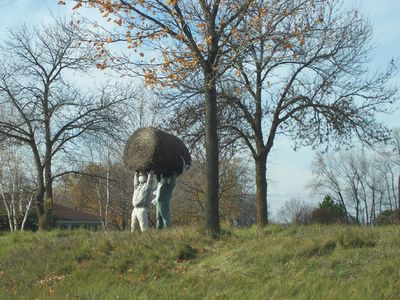
Behold the power of hay!

Sunset over Highway 7
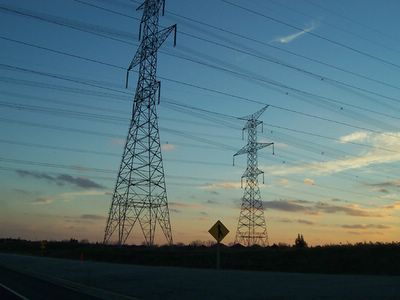
Sunset towers
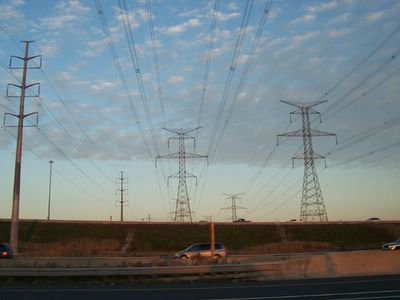
And their partners

Clouds lit by sunset over Don Mills Road
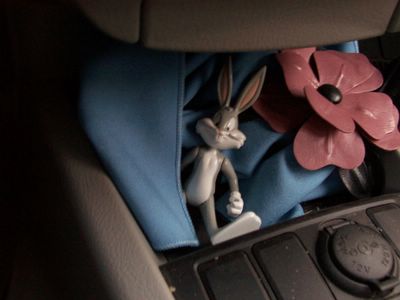
What's up?

Southbound on Don Mills Road

Southbound on Don Mills again, same location, a week later
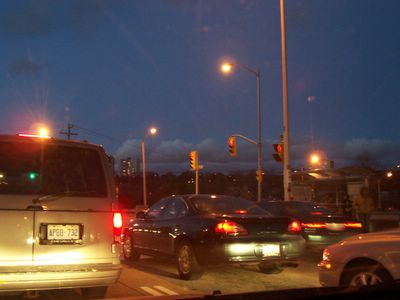
Low skies
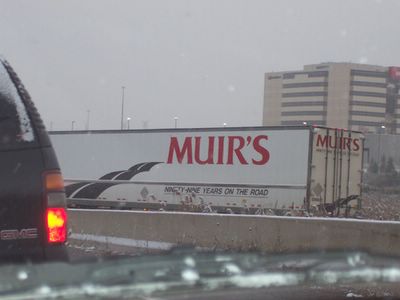
"Ninty-Nine Years On the Road" -- good slogan for a traffic jam
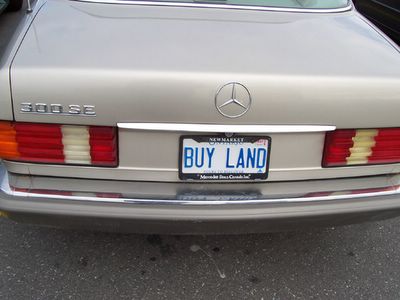
Looks like Pa Cartwright finally traded in his horse (be funnier if the plate said "Nevada", but hey...)
Derry and Creditview six years on...
Not too long ago, I posted some photos here that I took in May of 1999 at the intersection of Derry Road and Creditview Road in Mississauga. This intersection, about a century and a half old, was in the process of being closed for good at the time, in conjuction with the realignment of Derry Road further north to bypass Meadowvale Village, and because Hwy 407, then under construction, was bisecting Creditview -- a course deemed too inconsequential to warrant a bridge. My posting peaked my own curiosity, and I went back there in October of 2005 to see how things had changed. I was really surprised just how much they had.

New sign at the southwest corner.

Standing on the south side of Derry, looking west to the bend where Old Derry now turns south onto Old Creditview.

Looking east along Old Derry Road towards the Credit River and Meadowvale Village beyond.

Looking east from the north side of Derry Road.

The current intersection of Old Derry Road and Old Creditview Road, looking southwest.

Looking west down the closed portion of Derry Road.

Thanks to the strong wind, the 'sharp left turn' arrow sign was blown down as I stood on the corner, narrowly missing me.


West down Derry.
I drove this way hundreds of times in the 1990s. This view is about a mile from Mississauga Road (7/8 of a mile between concession lines, as I recall). If you compare these shots with the ones from 1999, notice that the signals have been removed from the railroad crossing signs, leaving only the cross to mark the place where no car will ever be at risk again.

Looking south down the tracks.

Looking north down the tracks. The old northbound stretches of Creditview are off to the left in this shot.

Looking east from the tracks to the existing intersection.

Standing on the tracks, looking west down the former course of Derry Road.

The former course of Creditview Road north from Derry, as it appeared in October, 2005.

An even older course for Creditview northbound from Derry.
This was closed before I visited the corner. It's considerably more overgrown than it was in the 1999 shot. I really don't know when they closed this section and built the newer track, a few yards to the left of this shot, but it must have been well over twenty years ago. It's strange that it's only now really beginning to be swallowed up. It was much more evident even six years ago that a road had once been here.


Looking west along the former course of Derry Road.

Looking east down the Derry Road.

Wide-angle view of the one-time north corner of Creditview Road (left) and Derry Road (right), with the railroad tracks that dogslegged Creditview. This view looks northeast.

Photo from a previous post: Looking west along the closed section of Derry Road, towards Mississauga Road in the distance, in May 1999.

...and the same view in October, 2005.

Photo from a previous post: Further westward along the closed section of Derry, May, 1999.

...and the same view, October, 2005.

New sign at the southwest corner.

Standing on the south side of Derry, looking west to the bend where Old Derry now turns south onto Old Creditview.

Looking east along Old Derry Road towards the Credit River and Meadowvale Village beyond.

Looking east from the north side of Derry Road.

The current intersection of Old Derry Road and Old Creditview Road, looking southwest.

Looking west down the closed portion of Derry Road.

Thanks to the strong wind, the 'sharp left turn' arrow sign was blown down as I stood on the corner, narrowly missing me.


West down Derry.
I drove this way hundreds of times in the 1990s. This view is about a mile from Mississauga Road (7/8 of a mile between concession lines, as I recall). If you compare these shots with the ones from 1999, notice that the signals have been removed from the railroad crossing signs, leaving only the cross to mark the place where no car will ever be at risk again.

Looking south down the tracks.

Looking north down the tracks. The old northbound stretches of Creditview are off to the left in this shot.

Looking east from the tracks to the existing intersection.

Standing on the tracks, looking west down the former course of Derry Road.

The former course of Creditview Road north from Derry, as it appeared in October, 2005.

An even older course for Creditview northbound from Derry.
This was closed before I visited the corner. It's considerably more overgrown than it was in the 1999 shot. I really don't know when they closed this section and built the newer track, a few yards to the left of this shot, but it must have been well over twenty years ago. It's strange that it's only now really beginning to be swallowed up. It was much more evident even six years ago that a road had once been here.


Looking west along the former course of Derry Road.

Looking east down the Derry Road.

Wide-angle view of the one-time north corner of Creditview Road (left) and Derry Road (right), with the railroad tracks that dogslegged Creditview. This view looks northeast.

Photo from a previous post: Looking west along the closed section of Derry Road, towards Mississauga Road in the distance, in May 1999.

...and the same view in October, 2005.

Photo from a previous post: Further westward along the closed section of Derry, May, 1999.

...and the same view, October, 2005.
Labels:
abandoned road,
Creditview Road,
Derry Road,
Mississauga
Subscribe to:
Comments (Atom)


